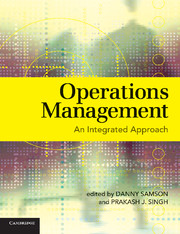Book contents
- Frontmatter
- Contents
- List of Contributors
- Preface
- Acknowledgements
- Part I Operations within Organisations – Building Blocks
- Part II Approaches to Understanding OM
- Part III Moving Forward with OM – Creating Competitive Advantage
- Part IV Challenges and Opportunities in Operations
- 11 Managing Risk in Operations
- 12 Sustainability in Operations Management
- 13 Operations Management in Different Settings
- Part V Case Studies
- Index
- References
13 - Operations Management in Different Settings
Published online by Cambridge University Press: 05 June 2012
- Frontmatter
- Contents
- List of Contributors
- Preface
- Acknowledgements
- Part I Operations within Organisations – Building Blocks
- Part II Approaches to Understanding OM
- Part III Moving Forward with OM – Creating Competitive Advantage
- Part IV Challenges and Opportunities in Operations
- 11 Managing Risk in Operations
- 12 Sustainability in Operations Management
- 13 Operations Management in Different Settings
- Part V Case Studies
- Index
- References
Summary
Learning objectives
After reading this chapter you should be able to:
identify the operations function in any kind of organisation or industry
identify the roles and responsibilities of operations managers in different organisational settings
identify the operations management aspects of your own career choice
describe any operation in terms of its transforming resources, transformed resources, operations processes and products and services
understand the similarities and differences between operations in different industries
discuss the roles and priorities of operations managers in different industries.
Box 13.1: Management challenge: transferring operations knowledge
The theories, techniques and models of the operations management field mostly originated in the manufacturing sector but have migrated into a variety of other industries and organisations. When managers study successful operations management in other organisations which could be in totally different industry sectors, a key challenge they face is identifying what lessons can be transferred to their own organisation. They also need to work out how the concepts can be translated so their employees can comprehend and deploy these new ideas. How do managers balance the trade-off between lessons from their own industry sector where concepts are easily understood and quickly deployed and novel input from other industries? How can you tell if new operations ideas are relevant for your organisation? Can they be immediately adopted or do they need to be adapted, or would some ideas that might well work in, say Toyota, not work or apply at all in, say a hospital?
- Type
- Chapter
- Information
- Operations ManagementAn Integrated Approach, pp. 381 - 406Publisher: Cambridge University PressPrint publication year: 2008



